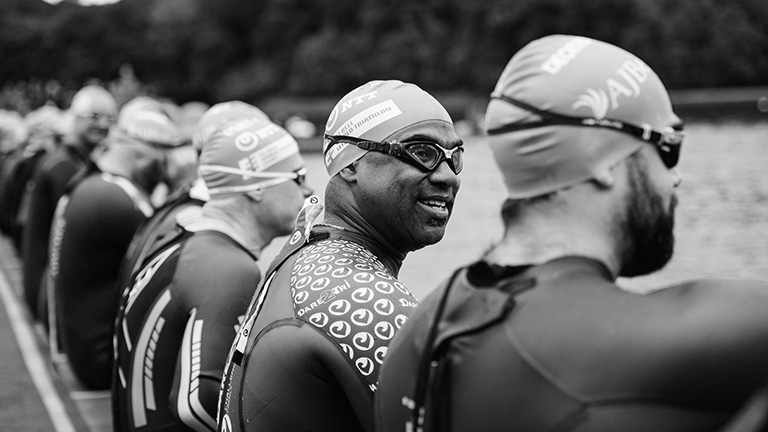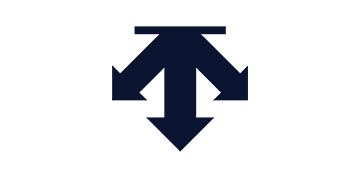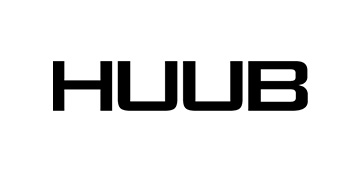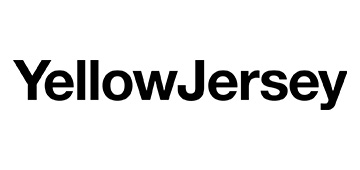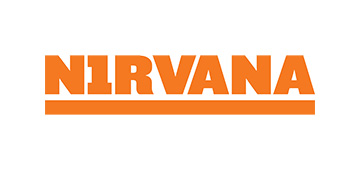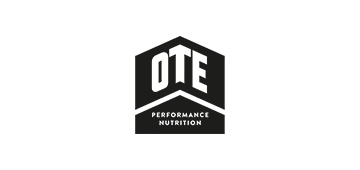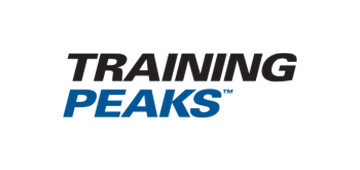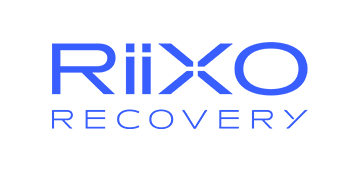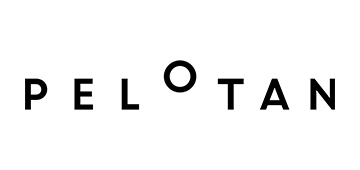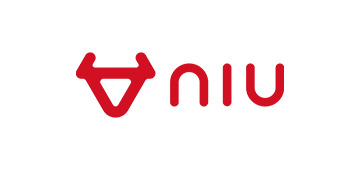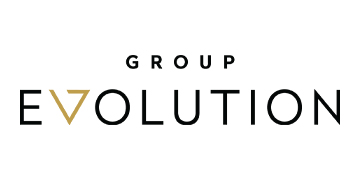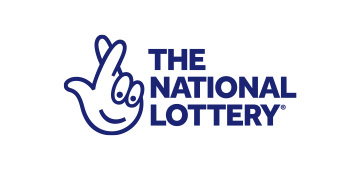Most people would probably assume that a person’s sexual orientation is a private matter and has no bearing on their ability to take part in Triathlon. Whilst that certainly should be the case, it isn’t always the perception of lesbian, gay or bisexual people.
Case Studies
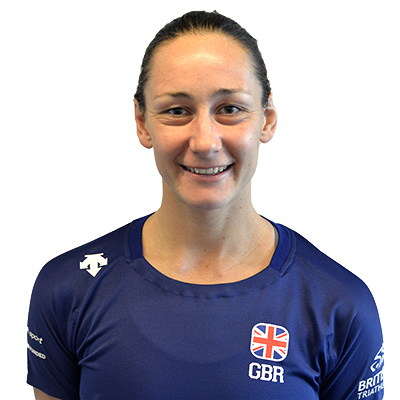

Nikki Bartlett
Nikki Bartlett is an IRONMAN athlete and paratriathlon PTVI Guide.
“When I came out, I had a really tough time with it and that was because not many people had come out at the time. It’s definitely grown to be more accepted now. I didn’t really know who to go and talk to, so it helps to have more platforms to go to.”
“The more people who can talk naturally about who they are the better. This allows people who are growing up in the sport to see that it’s open and inclusive to all people no matter your background.”
“It’s allowing people to be who they are and not be scared to be open and honest. When I came out twelve years ago, things were very different back then, I didn’t know anyone who was gay. But nowadays people can be more honest with who they are and the more we promote that, the more people can come out and be who they are.”
“Could we ever get to the point where we don’t feel different and we don’t feel like we have to come out?”


Jack Bristow
I came out as gay at university having already been a member of the triathlon club for a year. My club mates were some of the very first people I told and all of them were accepting and happy that I was able to be myself.
Coming out helped give me the self confidence to push myself to achieve goals I'd never have considered when i first took up triathlon. I have competed at European AG championships and medalled at this year's British championships.
I make no secret of being a gay triathlete, yet the guys I race against don't treat me any differently. My coach is supportive of me in every aspect and understands the connection between being able to be honest with myself and succeeding.
Coming out and taking up triathlon were two of the best decisions I've ever made.
Listen to Jack on the BBC’s LGBT Sport Podcast here
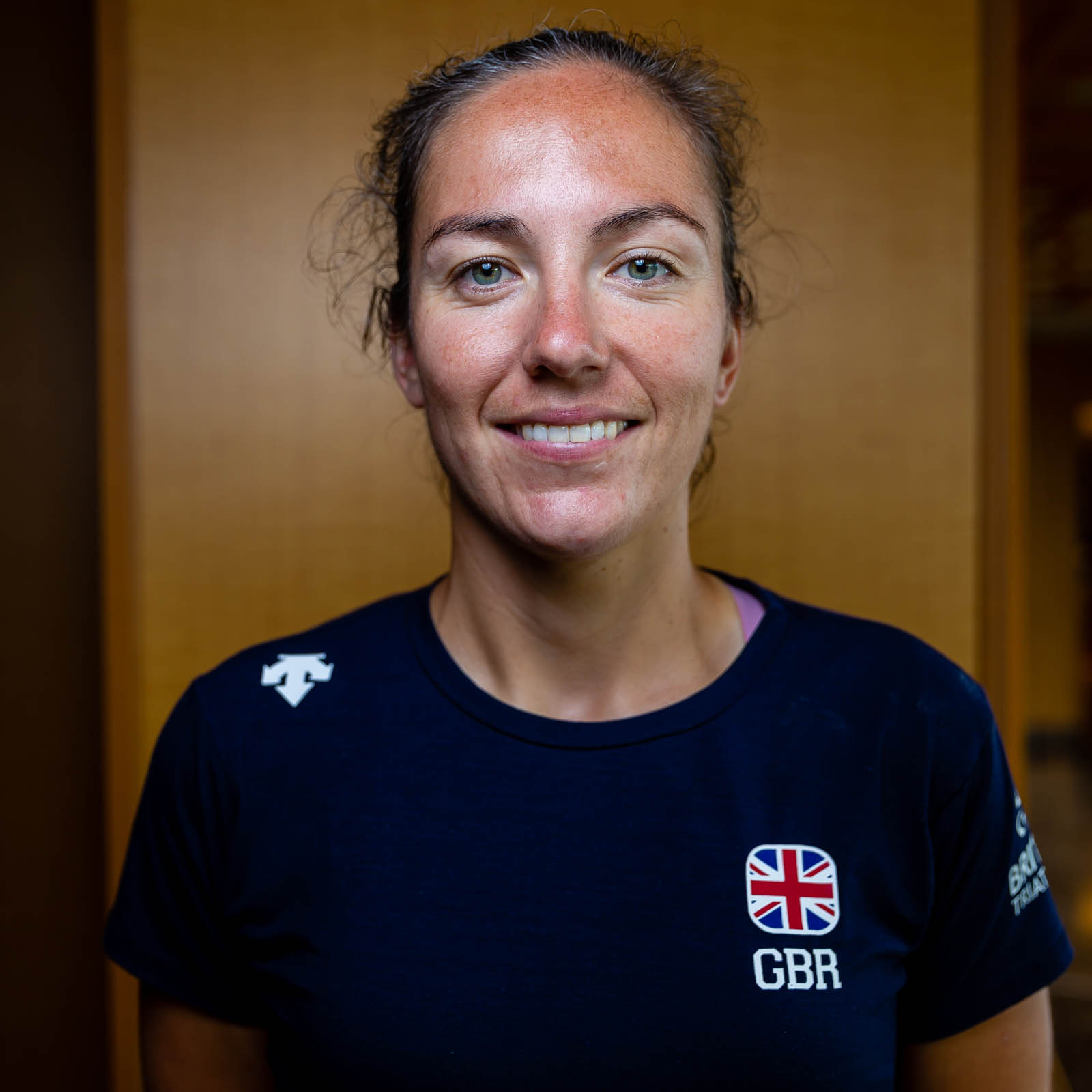

Bex Milnes
Bex Milnes is a Lead Paratriathlon Coach at British Triathlon's Loughborough Triathlon Performance Centre.
“The support for athletes is important, as is the advice for how to make environments more inclusive and education for event organisers. Simple things like creating more diverse application forms that cater for everybody or creating gender non-binary race categories to make the sport more inclusive.”
“Campaigns like this are great because they raise awareness and help normalise the discussion. You shouldn’t have to announce who you are as a person.”
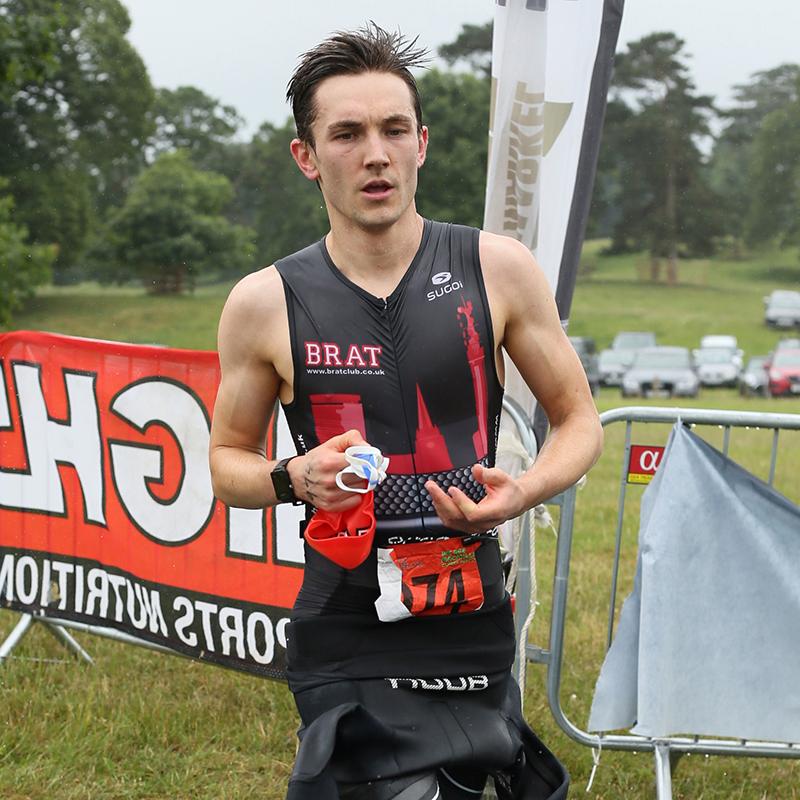
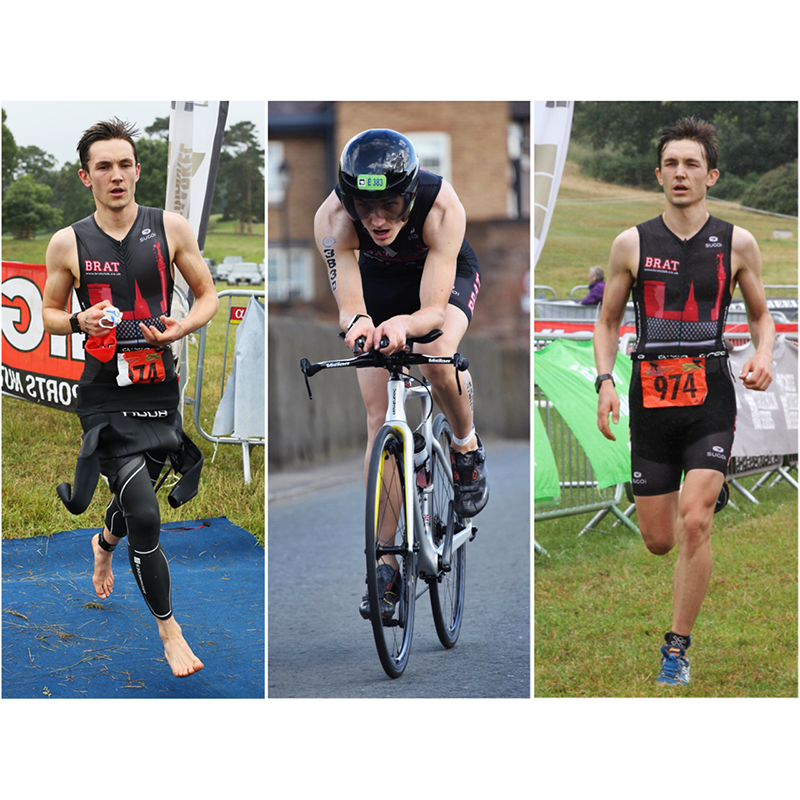
Elliott Packham
I stopped participating in sport, despite it being one of my biggest passions, when I began to consider coming out as gay at the age of 18. This was because I’d convinced myself that I’d receive a negative reaction from other people and wouldn’t be accepted in a sports club environment.
However I when I stumbled into the triathlon a few years later and found the courage to be myself, I discovered that other people were far more accepting than I had thought! The fear of other people’s reactions is something that I think manifests in a lot of LGBTQ+ people, but in my experience of triathlon at least, this fear has been completely unfounded. Being a triathlete is now a significant part of my life and I’m really ambitious in what I want to achieve in the sport. Training and competing in an inclusive environment has definitely helped me become a better athlete, as well as a happier one.
Of course, coming out to my clubmates was daunting at first, but doing so has allowed me to form much closer friendships, as I no longer feel like I’m hiding a part of who I am. Both of the clubs that I’ve been a part of, the BRAT Club and University of Birmingham Triathlon Team, have been very accepting and my sexuality has not affected my ability to participate at all.
My confidence has grown so much throughout my involvement in the sport, to the extent that I’m now also a qualified British Triathlon coach, something I wouldn’t have even imagined being five years ago. It really pleased me that the British Triathlon coach education programme included a comprehensive overview of the Equality Act 2010, meaning that coaches are being taught to be inclusive to all nine protected characteristics, including sexuality and gender.
Of course there is further work to be done to make triathlon more inclusive but it’s fantastic that British Triathlon are running this campaign and I’m very proud to support it. I firmly believe that it’s through campaigns like this that the wider sporting community can be educated to make sport welcoming to everyone. If you are an LGBTQ+ person reading this and thinking about giving triathlon a go, I couldn’t recommend it highly enough!


Rick Bateson
Tribe Tri London
I have two older brothers and growing up, as they racked up the marathons, judo medals and lifesaving badges, I definitely felt like a sporting let-down. It didn’t help that I hated the competitive team sports environment that school creates (I can’t throw or catch a ball). But I love to be active and got into sport on my own terms; sailing, canoeing, waterskiing, and even a short stint on the university high-board diving team. In my 20s I found I was good at running, swimming and cycling which led to triathlon. It’s a sport I instantly loved and have been doing for over 10 years now, competing usually at the Olympic distance. It’s a really inclusive sport which suits any ability, and offers the opportunity to take part for fun, fitness, competitively, or at a national level.
The training for triathlons as we all know can be time consuming and pretty lonely, and I didn’t know any other triathletes so I decided to join a local tri club. Still having a slight (and possibly unjustified) fear of straight-male dominated sports clubs, I decided to look around for a gay friendly one. I was really surprised to discover there wasn’t anything. Front-runners and Out to Swim were doing great stuff but there was nothing specific to triathlon. So I set up a little network called Tribe. It’s mainly a facebook group, but has been a fantastic way for like-minded people to get in touch with each other and I’ve made some really good friends through it. The camaraderie of competing in the same event with mates is a feeling that can’t be beaten.


Emily
Out To Swim and London Frontrunners Triathletes
After 5 seasons in triathlon, I felt tired and burnt out. Tired from being selfish, centring everything around my own training, burnt out from chasing qualifiers, world championships and the oneupmanship in Ironman. I had forgotten the fun part of triathlon was the team mates at training camps. At Out To Swim and London Frontrunners I can train with my LGBT friends, I can now train and socialise at the same time! I persuaded some of the swim girls to join the running club and vice versa, progressed some learner swimmers from the swim sessions I coach to a club…Eventually there was a pub chat about triathlons, which resulted in a group of us entering the Women only Tri at Dorney Lake the day after pride in London… We now train (hang out) every week and go to events together!

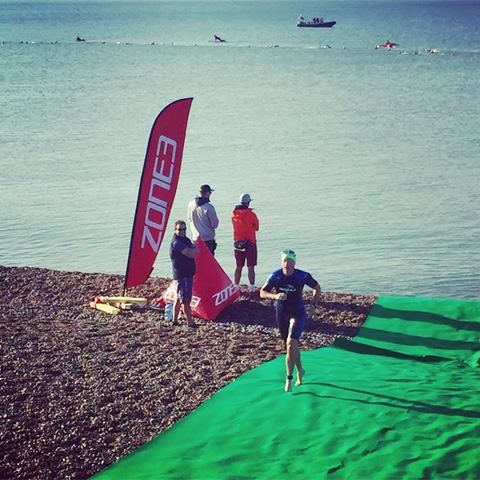
Jacob
I have loved running for many years and was inspired to share this passion with the trans community as it can be very cathartic for people who have often been left out of sport and athletics, and may not have a positive relationship with their bodies. I gained a leadership in running fitness qualification and lead seasonal courses for beginners and improvers. Over the years I have run dozens of races, Beachy Head Marathon being my personal highlight.
As my running developed I unfortunately suffered many injuries which led me to begin taking cross-training much more seriously, and this was the beginning of my interest in triathlon. I got chatting to the lovely team from my hometown triathlon and we struck up a plan to engage more LGBT people in the sport.
I spent some time training with the brilliant Brighton & Hove Triathlon Race Series and took on the Brighton & Hove Triathlon with some LGBT friends this year. Being an ambassador I tried to get some people who might otherwise not engage with triathlon to sign up to the Rainbow Wave, and I am looking forward to next year’s event where I hope to put together a triathlon coaching schedule with the Trans Can Sport project (a local initiative providing free sport & fitness classes to the trans community and their allies) with whom I coach.
I am not a seasoned triathlete, but I strongly believe there needs to be more Trans representation across sports & athletics. Amazing role models like Chris Mosier are leading the way and I hope inspiring more people like me in the community to get involved.
When I'm not training for triathlon, I work as a local activist and trainer, and coordinate projects for a Brighton based charity.
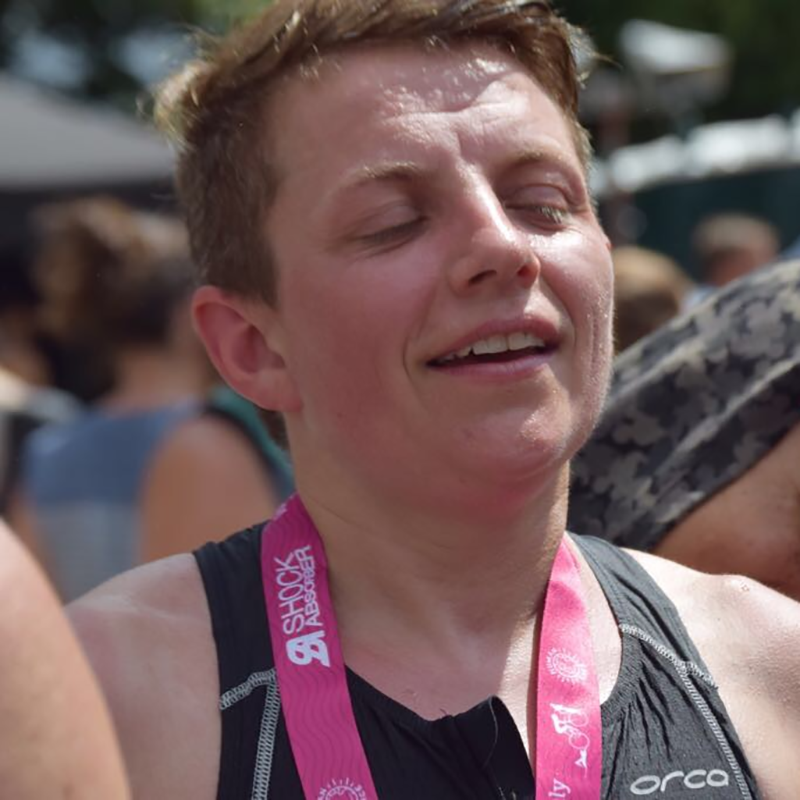

Erika
Out To Swim and London Frontrunners Triathletes
About 3 years ago I decided that I would like a new challenge in my life. Triathlon seemed challenging enough as it meant learning how to swim and face some of my fears. I started looking for places and lgbt clubs who could provide swimming lessons for beginners. A friend suggested WSWIM (women only swim sessions) run by Emily Chong. I found it was great start as all level women were welcome and Emily would focus on our individual needs. Emily as well suggested I could try join OTS (gay swimming club) lessons. The club was great encouragement to progress and learn more. OTS has women only swim session on Thursday nights which I joined and found that it worked well for me from day one. The ladies were very welcoming and supportive. We would socialise after every swim, started attending competitions together and socialise after work. It quickly became my little sports family. When I tried to find different sport clubs in London I felt they were very male focused. Finding a club with sessions for women (and especially gay women) was one of the best finds.
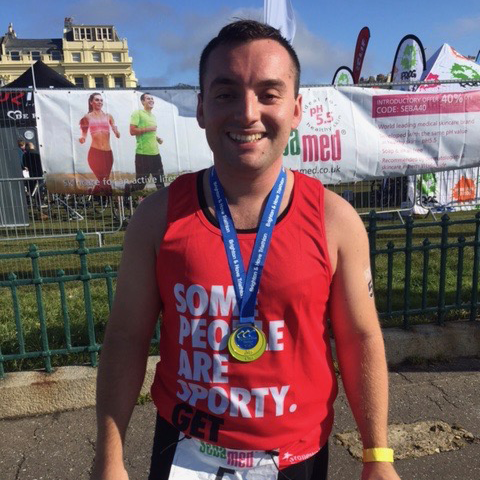

Andréa Avena
As a beginner in the world of triathlon, what inspired you to start?
Earlier this year I joined Castle Triathlon Series and found a warm, welcoming and incredibly fun community within the triathlon world. I have been welcomed with open arms as both a beginner triathlete (you're more likely to find me in a pub than the gym) and as a gay person. After watching so many inspiring people take part in triathlons this summer I really wanted to take part in one myself!
Why did you pick us to be your first triathlon?
When choosing a triathlon to take part in for the first time I looked for a triathlon, which was welcoming to newcomers to triathlon. I’d been recommended the Brighton and Hove Triathlon by a few friends in the industry, and I checked out the really positive reviews from last year’s competitors on RaceCheck.com which convinced me that Brighton was the on. I also really liked the idea of a sea swim!
Tell us about your decision to fundraise for Stonewall.
In the UK 100 hate crimes are committed against LGBT people every year, with many more going unreported. Being gay is illegal in 75 countries and punishable by death in ten countries. Over 75,000 children in the UK experienced homophobic or transphobic bullying in schools last year.
I wanted to compete in the Brighton and Hove Triathlon to raise money for Stonewall, the equality charity that promotes LGBT rights and acceptance without exception. My personal aim is to raise awareness of triathlon as a welcoming and diverse sport and help to raise funds to further promote LGBT acceptance in other sports and in society as a whole.
Being Gay in Triathlon
I’ve found the triathlon community to be incredibly accepting of me as a gay person, through both working in the triathlon world and beginning to take part in triathlon myself. Overall, I have found that triathlon as a sport is inclusive of people of all ages and abilities, with a race distance for juniors to people tackling full-iron distances – everyone can give it a go. With a wide range of backgrounds, and a community which often travels to different races together, I’ve always felt that I’ve been able to be open and myself in every situation I’ve found myself in.
Seeing that Stonewall was a sponsor for Brighton and Hove Triathlon was a great way to see that Brighton’s triathlon was a proudly LGBT inclusive event, and this meant that it had to be location for my first triathlon race. Racing in Brighton, whilst proudly wearing my Rainbow Laces is quite a symbolic moment for me which summarises the sport’s acceptance of LGBT people. Whilst I know that not all sports can be as welcoming, I hope that helping to raise awareness and funds for Stonewall will help to promote acceptance in the sporting world. I’ll look forward to racing again in Brighton and Hove Triathlon as well as Windsor Triathlon next year to hopefully raise more money for Stonewall!
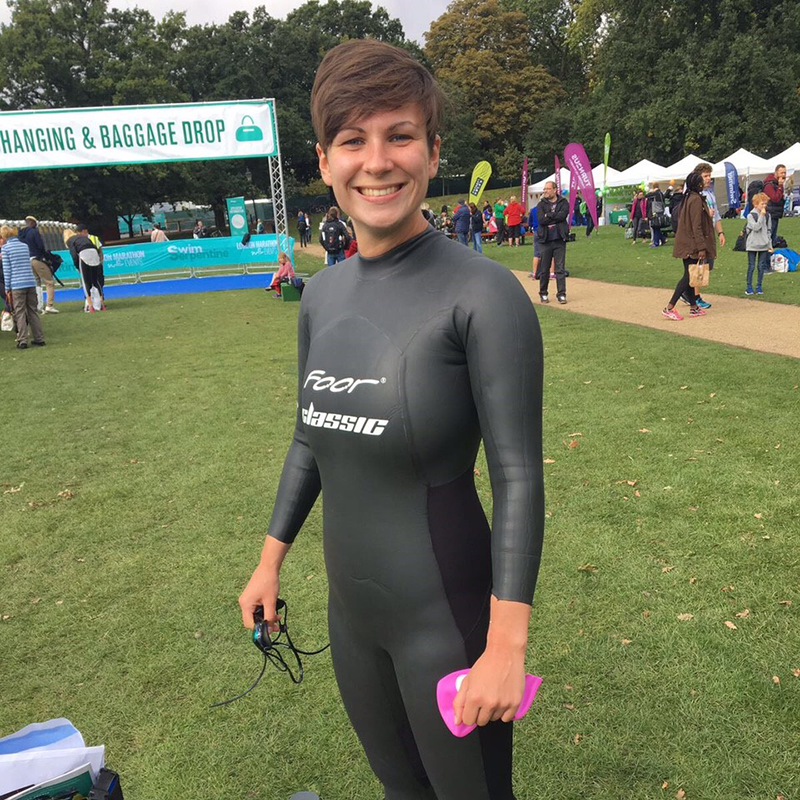

Izzy
One of the last goals to tick-off on the “30 things to do before I’m 30 list” was to take part in a sprint triathlon. As a keen swimmer and cyclist, I was already two thirds of the way there.
The idea of rocking up to one of these big events on my own however was intimidating, and the logistics of travelling by train to an out-of-London venue for an early start seemed near impossible. It was the beginning of the last summer before the big birthday that a friend invited me to join an LGBT swimming club and introduced me to a group of women who were starting out in triathlon. Our haphazard training sessions on the Olympic Park - starting in the Aquatic Centre, then onto the Velodrome with maybe with a run in between, always ended with a pint.
These casual sessions became not only about achieving a goal I had set for myself, but also about a new social circle of like-minded women. From understanding why elastic laces might be useful on the day, to cycling to the venue together at the crack of dawn, these 6 women made the whole experience of my first event fun, memorable and far from intimidating. Since completing my first triathlon in August, not only have I set myself new sporting goals with my new team, but have found a sense of belonging in a supportive and welcoming community.


Micheal Gillespie
Tribe Tri London
London 2012 will always be special to me; I didn’t represent Team GB that summer but I did take part in my first triathlon. I didn’t even know anyone who had done a triathlon and so I found myself setting up in the transition embarrassingly unprepared; not even knowing what I should be wearing under my wetsuit. Triathlon suits, Garmin watches, power meters, heart rate monitors, even clip-in pedals, remained a distant expense! I quickly identified a fellow Scot by their accent and asked for help; their willingness to take time and explain the basics sums up the positive and welcoming environment of triathlon.
After finishing competitive swimming when I was 18 I never really involved myself in sport; perceiving it as a difficult environment to be openly gay in. Ten years on I felt the desire to get back into sport and set my sights on the London triathlon. Triathlon seemed a new and significant challenge considering I didn’t run or cycle. I joined Out to Swim, an LGBT swim team, in order to meet people and to rebuild my confidence in the sport on a more open basis than had been possible as a teenager.
Since 2012 I have done everything from sprint distance to Ironman and a few quadrathlons, building up a network of friends on the way. Triathlon has maintained an openness to first timers and diversity, without the stuffiness or hangovers common in other more established sports. It has provided me with the opportunity to take on new challenges, re-engage in sport on my own terms and lead a healthy and active lifestyle. Plus I now know what to wear under a wetsuit and have returned the favour to others looking similarly dazed and confused in transition areas.
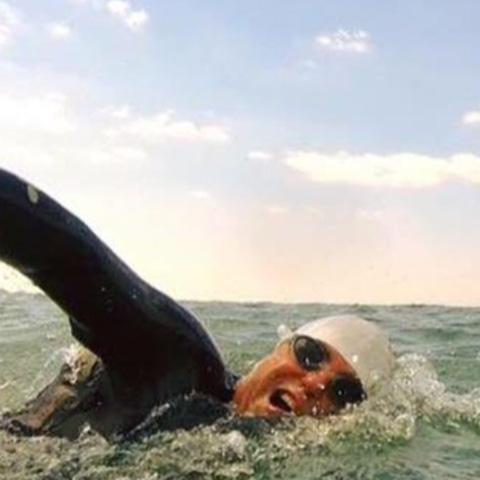

Damian Brewer
Tribe Tri London
I have been a triathlete since the age of 16, which is over 25 years in triathlon. In that time, I’ve seen the popularity of the sport explode. My school organised a triathlon back in 1992 which I did in my rugby kit and a mountain bike and I almost came last! The following year I joined Worcester Triathlon club where I continued to compete, dropping my standard tri time down to 2.05. In those days triathletes raced in crop-tops and padded speedos, the locals must have wondered what was going on.
After I came out I joined Out to Swim and went on to compete in the Sydney Gay Games in 2002. The opening ceremony was inspirational. The memory of marching into a stadium with thousands of people cheering still pulls the hairs up on the back of my neck. It was so nice to not have to worry about being gay in this safe, inclusive space. I have since been fortunate to compete in the Gay Games Chicago 2006, OutGames Montreal 2006, Gay Games Cologne 2010, and will be going to Gay Games next summer in Paris.
In 2002 I set up Out to Tri, an LGBT triathlon group. This was before Facebook, so was hard to maintain. It ended up being an email group and the website kept going for a few years. I have met some great people through triathlon. There is still an assumed heteronormity in sport, and therefore limited visibility of LGBT people in tri but it’s definitely getting better all the time.
I hope to be still competing/completing tri in another 25 years, but it doesn’t get any easier the older I get!


Sophie
Out To Swim and London Frontrunners Triathletes
All of a sudden I found myself feeling quite alone in London. ... I needed to make some friends here to survive this city. So... I swam.. and....ran.... ! Through that I met a few girls who wanted to take that further. Triathlon had always been in the back of my mind but I never really knew how to make it happen. One day, friends that I swam with invited me and encouraged me to enter a triathlon.(


